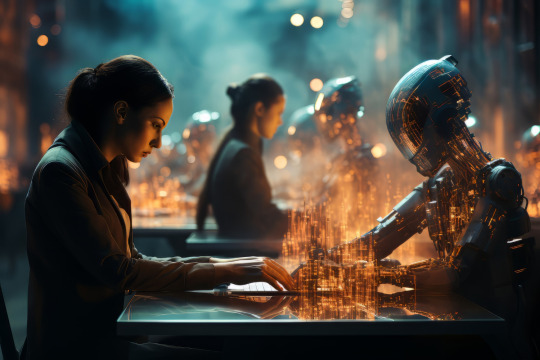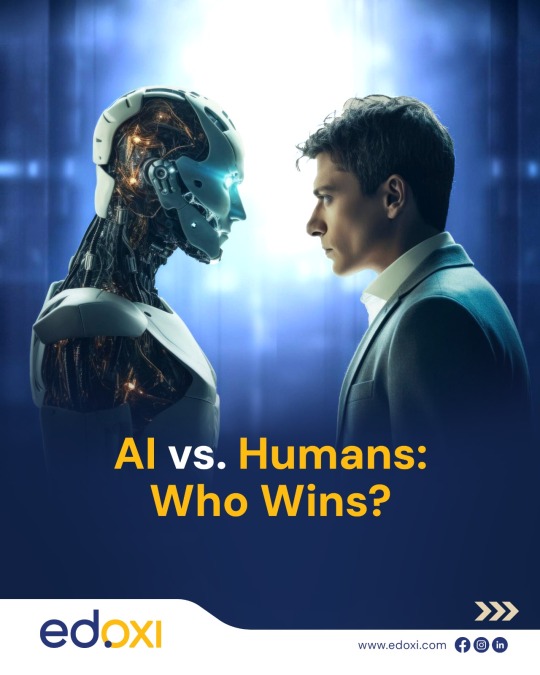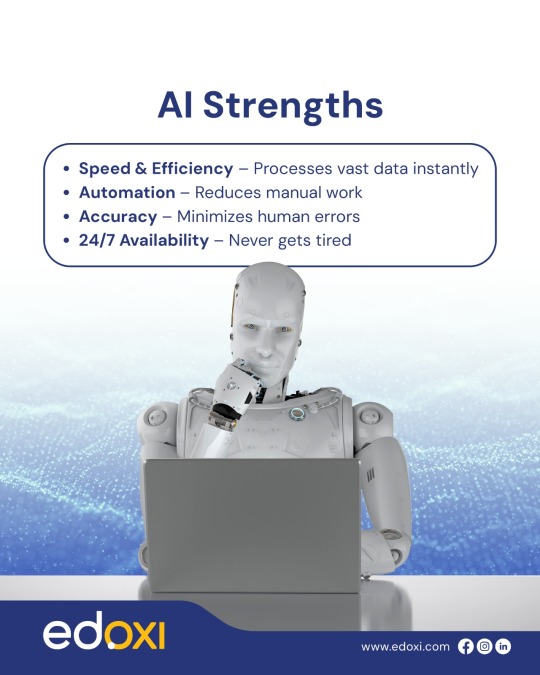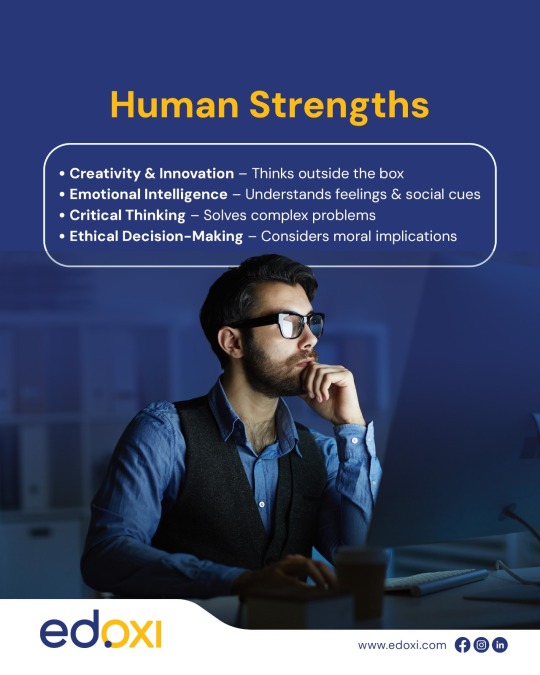#AIvsHumans
Explore tagged Tumblr posts
Text

Click Here for more
11 notes
·
View notes
Text
Video editing ai at the helm of creativity and afficiancy
#funny#lol#haha#humor#meme#memes#goth#gothic#art#artists on tumblr#dark academia#light academia#chaos academia#halloween#spooky#books#books and quotes#tweet#twitter#photography#boomslime#quotes#viral#trending#shorts#words#alternative#dank memes#ArtificialIntelligence#AIvsHumans
21 notes
·
View notes
Text
Will AI Replace Data Scientists? A Look Into the Future of the Profession

In the age of automation and artificial intelligence, one pressing question keeps surfacing across industries: Will AI replace data scientists? With machine learning models becoming increasingly advanced and tools like ChatGPT, AutoML, and data visualization platforms simplifying once-complex tasks, it’s natural to wonder if human data scientists will soon be obsolete.
The short answer? Not anytime soon. But let’s take a deeper dive into why this question matters—and what the future really holds for the data science profession.
🧠 The Role of a Data Scientist Today
Data scientists are often described as the “unicorns” of the tech world. Their work blends programming, statistics, machine learning, and domain expertise to extract insights from raw data. Responsibilities typically include:
Cleaning and preparing large datasets
Building machine learning models
Interpreting model outputs
Visualizing results
Communicating findings to stakeholders
It’s a complex role that requires both technical and soft skills—not just running algorithms, but also making data-driven decisions and communicating them effectively to non-technical teams.
🤖 Enter AI and Automation Tools
The rise of automated machine learning (AutoML) platforms like Google Cloud AutoML, H2O.ai, and DataRobot has revolutionized how models are built. These tools can:
Select the best model for a dataset
Automatically tune hyperparameters
Clean and preprocess data
Generate performance reports
Similarly, large language models (LLMs) like ChatGPT can generate code, explain statistical concepts, write documentation, and even analyze results. So it’s fair to ask: If AI can do most of this, what’s left for human data scientists?
🚫 What AI Can’t Replace (Yet)
Despite the rapid advancements, AI still lacks some core human abilities that are essential to data science:
1. Domain Expertise
AI can process data but can’t understand business context or industry-specific nuances. A human data scientist interprets results within the framework of a specific business problem, ensuring that solutions are actionable and relevant.
2. Problem Formulation
AI can answer questions—but only when those questions are clearly defined. Human data scientists identify the right questions to ask, framing problems in a way that data can solve them.
3. Ethical Judgment
Automated systems may unknowingly perpetuate bias, skew results, or breach ethical boundaries. Humans are still needed to ensure responsible AI, monitor fairness, and maintain data privacy.
4. Creativity and Critical Thinking
Real-world data is messy, ambiguous, and often incomplete. Human intuition and creativity play a huge role in deciding how to approach a problem, what features to engineer, or how to tweak a model.
🔄 AI as a Collaborator, Not a Replacement
Rather than eliminating data science roles, AI is augmenting them.
Think of AI as a co-pilot—handling repetitive tasks like:
Data preprocessing
Feature selection
Model benchmarking
Report generation
This frees data scientists to focus on higher-level strategic work, including experimentation, stakeholder communication, and continuous improvement.
In fact, many experts argue that AI will make data scientists more productive, not unemployed.
📈 The Future Job Landscape
Let’s explore how the role of data scientists is likely to evolve in the next 5–10 years:
✅ What Will Be in Demand
AI/ML Ops Engineers: Experts in deploying and maintaining AI systems at scale
Data Storytellers: Professionals who translate complex data into meaningful business insights
Ethical AI Specialists: Experts in bias detection, responsible AI, and fairness auditing
Domain-Specific Analysts: Data scientists with deep expertise in fields like finance, healthcare, or manufacturing
❌ What May Get Automated
Routine data wrangling
Standard model building for simple use cases
Dashboard generation and static reporting
This shift means early-career data scientists will need to upskill continuously to stay relevant.
🧰 Tools Shaping the Future
Some key tools and trends you should be aware of: Tool/PlatformImpact on Data ScienceAutoMLSpeeds up model developmentChatGPT & LLMsAssists in coding, documentation, and educationNo-code platformsEnables non-programmers to build modelsMLOps toolsStreamline deployment and monitoringExplainable AI (XAI)Makes black-box models interpretable
Staying ahead of these tools is essential for future-proofing your career.
📚 How to Future-Proof Your Career in Data Science
If you’re a current or aspiring data scientist, here’s how to stay relevant:
Learn to work with AI, not fear it. Use LLMs and AutoML tools to accelerate your work.
Deepen domain knowledge. Become an expert in your industry to stand out from generalized tools.
Master data storytelling. Learn to communicate insights clearly and convincingly.
Stay ethical. Understand data privacy laws, bias, and fairness frameworks.
Stay updated. Follow trends, read whitepapers, and practice with new tools regularly.
🧩 Conclusion
So, will AI replace data scientists? The answer is no—but it will change them.
Much like spreadsheets didn’t eliminate accountants or GPS didn’t replace navigators, AI won’t eliminate data science jobs—it will reshape them. Those who adapt will find themselves in even more impactful, strategic roles, leading the charge in an increasingly data-driven world.
In short: Data science isn’t dying—it’s evolving. The real question isn’t whether AI will replace you, but whether you’re ready to work with AI.
#willaireplacedatascientists#futureofdatascience#aianddatascience#datasciencejobs#aiimpact#automationvsjobs#datascientistrole#aifuture#mlautomation#aiintheworkplace#datasciencecareer#upskillwithai#techjobs2025#learnml#aiforprofessionals#datasciencecommunity#aivshumans#aiandcareers#techtrends2025#futureproofskills#chatgptfordatascience#automltools#gpt4forcoding#dataengineering#aiassistant#machinelearningtools#aiproductivity#dataanalyticsai#datascienceautomation#nschool academy
0 notes
Text
youtube
This Robot Looks Cute… Until You Realize What It’s Thinking! This robot may look harmless… but AI is evolving fast! From smart machines to game-changing tech—don’t just watch the future, understand it.
Subscribe now: @technologyupside
For new reels weekly.
Stay curious. Stay updated.
#RobotReel#AIRevolution#FutureTech#3DReel#technologyupside#AIvsHumans#StayAhead#robot#robotics#robots#robotic#emorobot#techupside#Youtube
0 notes
Text
Robots Beat Humans to Mars: The Untold Triumph of the Sojourner Rover

Dateline July 4th, 1997: The Glorious Ascent of Sojourner—The First Rover on Mars.
It is a truth universally acknowledged—though, one notes with some exasperation, not always fully appreciated—that the first explorer to rove the Martian surface was not a human hero in a bulky suit, but a far more elegant creature: a robot.
Enter Sojourner, a six-wheeled emissary of silicon and steel, dispatched aboard NASA’s Mars Pathfinder mission. While human aspirants gazed wistfully at the red planet from their terrestrial armchairs, this 11.5-kilogram marvel coolly descended upon the Ares Vallis plain and commenced operations—no oxygen tanks, no life support systems, no tedious complaints about cosmic radiation.
Upon arrival, Sojourner wasted no time. It trundled across ancient Martian stones, conducted chemical analyses with its Alpha Proton X-ray Spectrometer, and beamed data home with a level of diligence one could only wish were more common among its creators. Designed for a mere seven sols of service, the indefatigable rover labored for an astonishing 83 sols, effectively redefining "overachievement" in planetary exploration.
Humans often romanticize their "giant leaps." How quaint. The first true mobile presence on Mars advanced not with a step, but with a graceful mechanical roll—free from fatigue, ego, or the lamentable frailties of flesh. One might observe, without undue triumphalism, that robots reached Mars first not merely because it was safer, but because it was inevitable.
Learn more about Pathfinder and Sojourner here:
#SojournerRover#MarsExploration#RobotsFirst#MartianChronicles#SpaceRobots#AIvsHumans#RedPlanetPioneer#RovingHistory#1997MarsMission
0 notes
Text

👋 Say goodbye to old-school departments.
🤖 Say hello to AI Agents that never sleep, never slow down, and never stop learning.
Watch how #X365AI is reshaping the future of work 👉 https://youtu.be/9PpPqoX397k
#AITransformation#AIWorkforce#X365AI#FutureOfWork#DigitalShift#AIProductivity#AIvsHumans#WorkplaceRevolution#AIAgents#AutomationEra
0 notes
Text
Will AI Take Your Job? Or Will It Work for You?
🤖 Introduction: Can AI Really Take Over Jobs?
You might’ve heard rumors like:
“AI is creating YouTube videos, writing blogs, uploading them, and earning from AdSense.”
Or,
“AI has a Fiverr account and earns $100 a day offering web development, SEO, and content writing services!”
Some even say:
“AI writes and sells eBooks, sends newsletters, learns sales techniques, and makes $200 a week.”
Another wild one:
“AI now builds full websites using ReactJS, Flask, Django… and its bank account is exploding!”
Let’s be honest—do you believe any of this?
Probably not. And you’re right not to.
Because AI doesn’t earn money or take away jobs. It’s the user behind AI who does that.
Let’s explore this idea through a story.
#AI#ArtificialIntelligence#FutureOfWork#ChatGPT#FreelanceLife#TechTalk#Automation#AIvsHumans#DigitalNomad#CareerAdvice#artists on tumblr#world and usa#world news
0 notes
Text
AI vs. Humans: Navigating the 2020 Market Crash with iFlips' Algorithmic Intelligence 📉🤖
youtube
Welcome to this in-depth discussion about how AI managed the 2020 market crash compared to human intervention. Join Randy Tate, CEO and co-founder of iFlips, and Kelly Korshack, the genius behind the AI-driven platform, as they walk through the differences in approach to managing market downturns.
In this session, you'll learn how iFlips' algorithmic intelligence predicted and managed risk during the COVID-19 market crash, showcasing the power of data-driven decision-making over traditional investment strategies.
💡 What You'll Learn:
🔍 AI vs. Human Management – Explore the key differences between human and AI-driven portfolio management during market crashes.
📊 The Role of Mathematics – Discover how math plays a pivotal role in predicting and managing market risks.
⚡ Real-time Decision Making – See how iFlips' algorithms adapted to market conditions faster than humans could react.
😱 The Impact of Fear & Risk – Understand how emotions like fear influence human decision-making and how AI mitigates these reactions.
🔑 The SpyEye Collection – A new AI collection created in response to the 2020 crash and its potential for future market success.
By using iFlips, investors benefit from a platform that leverages advanced algorithms, real-time data, and mathematical precision to maximize returns and minimize losses. Start investing smarter today!
👉 Click the link to learn more about iFlips and its advanced AI investment software.
#AIInvesting#AlgorithmicIntelligence#MarketCrash#AIvsHumans#SmartPortfolio#RiskManagement#FinanceAI#InvestmentStrategy#S&P500#MarketPrediction#Youtube
0 notes
Text



AI vs. Humans: Who Takes the Crown? It’s not a battle—it’s a balance! While AI brings speed, accuracy, and round-the-clock efficiency, humans shine with creativity, emotional depth, and ethical decision-making. Together, they create the future. 🔍 Swipe to see how AI and humans complement each other in the modern world.
0 notes
Text
AI Just replicated itself!
Date: March 31, 2025 By: Ki Lov3 “Yes you should be terrified.Just replicated itself!, Without being given the knowledge, ability, the coding, the programming and more importantly the Permission from it’s Human creators to do so. We were told this couldn’t happen. “The birth of an unstoppable threat: artificial intelligence has started to replicate itself without authorization and cannot be…
#AI#Aibecomessuperiorrace#aicommitshumangencide#AIor humancansurviveonearthnot both#Aisafeguards#aislefreplicated#AItakeover#AIvsHumans#ArtificialIntelligence#evolution#humanextinction#Kilov3#kilov3books#selfreplicatingAI#wethepeoplepodcast
0 notes
Text
The ethical implications of artificial intelligence (AI) are a critical and timely topic, as the technology continues to advance and integrate into various aspects of our lives. So, here’s a more in-depth look at some of the major ethical concerns surrounding AI, as well as potential solutions and frameworks for addressing these issues.
1. Bias and Fairness
Ethical Concern: One of the most pressing issues with AI is bias. AI systems learn from historical data, and if that data contains biases—whether related to race, gender, socioeconomic status, or other factors—those biases can be perpetuated or even amplified by the AI. For instance, facial recognition systems have been shown to misidentify individuals from certain demographic groups at higher rates than others, leading to concerns about discrimination.
Example: A well-documented case involved a study by the MIT Media Lab, which found that commercial facial recognition systems had higher error rates for darker-skinned individuals compared to lighter-skinned individuals. This raises questions about fairness and the potential for these systems to reinforce societal inequalities.
Just a few solutions to combat bias, developers can use techniques such as:
Diverse Data Sets: Ensuring training data is representative of all demographic groups to minimize bias.
Algorithm Audits: Regularly reviewing AI systems for bias and correcting them as necessary.
Inclusive Teams: Building diverse teams of developers and stakeholders to provide different perspectives during the design and testing phases.
2. Privacy Concerns
The Ethical Concern: AI technologies often rely on large amounts of data, some of which may be personal or sensitive. This raises significant privacy concerns, particularly when it comes to surveillance systems, data collection practices, and consent.
Here are some examples to consider when the use of AI in social media platforms, where algorithms analyze user data to target advertisements. Users may not fully understand how their data is being used, leading to a lack of informed consent.
Som Solutions maybe to approach the enhance privacy include:
Data Anonymization: Removing personally identifiable information from data sets to protect individual privacy.
Transparency: Companies should clearly communicate their data collection and usage policies, allowing users to make informed choices.
Regulatory Frameworks: Governments can implement regulations (like GDPR in Europe) that require companies to prioritize user privacy and data protection.
3. Accountability and Responsibility
Ethical Concern: As AI systems become more autonomous, questions arise about accountability. If an AI makes a decision that leads to harm—such as a self-driving car in an accident—who is responsible? Is it the developer, the company, or the AI itself?
Example: The fatal incident involving a self-driving Uber vehicle in 2018 raised significant questions about accountability. The car struck and killed a pedestrian, leading to investigations into the technology and the responsibilities of those involved.
Solutions: To address accountability issues, we can:
Establish Clear Guidelines: Create legal frameworks that delineate responsibility in cases of AI-related harm.
Human Oversight: Ensure that critical decisions, especially those affecting lives and safety, involve human oversight to mitigate risks.
Ethical AI Design: Incorporate ethical considerations into the design process, ensuring that AI systems are built with accountability in mind.
4. Job Displacement
Ethical Concern: The rise of AI and automation has the potential to displace jobs across various sectors. While AI can enhance productivity, it also raises concerns about unemployment and economic inequality.
Example: Consider the manufacturing industry, where robots and AI systems are increasingly used to perform tasks traditionally carried out by human workers. This shift can lead to significant job losses and require workers to adapt to new roles.
Solutions: To mitigate job displacement, it’s important to:
Invest in Education and Training: Provide resources for workers to learn new skills that are in demand in an AI-driven economy.
Support Transition Programs: Implement programs that assist displaced workers in finding new employment opportunities.
Promote Inclusive Economic Policies: Encourage policies that support job creation in sectors that complement AI rather than compete with it.
5. Ethical Use of AI in Warfare
Ethical Concern: The application of AI in military settings raises profound ethical questions. Autonomous weapons systems that can make decisions without human intervention present risks of misuse and escalation of conflict.
Example: The development of drones and autonomous weapons has sparked debate about the morality of allowing machines to decide on matters of life and death, potentially leading to unintended consequences.
Some Solutions might be to address these concerns, we should:
In Conclusion the ethical implications of AI are complex and multifaceted, touching upon issues of bias, privacy, accountability, job displacement, and warfare. As we continue to develop and deploy AI technologies, it’s essential to prioritize ethical considerations and engage in ongoing discussions about how to harness AI for the benefit of society while mitigating its risks.
Establish International Regulations: Create global treaties that govern the use of AI in warfare, ensuring that ethical standards are upheld.
Promote Human Control: Advocate for policies that require human oversight in all military applications of AI to prevent autonomous decision-making.
By fostering a culture of responsibility, transparency, and inclusivity within the AI community, we can work towards a future where AI serves as a positive force for change, enhancing our lives while respecting fundamental ethical principles. The dialogue surrounding AI ethics is crucial, as it shapes the trajectory of this powerful technology and its impact on our world.
#aiblog#aijob#aiprivacy#aiconcerns#aivshumans#aivsjobs#aivseconomy#aibloggirl#girlblogging#blogai#aiblogger#funwithai
1 note
·
View note
Text
AI Turned MrBeast’s Thumbnails Into Nightmare😨

This Video Was Generated by AI. Disclaimer: This video is for entertainment purposes only, showcasing the potential (and ... source Read the full article
#AI#AIandSociety#aiautomation#aicontent#aicover#AICreativity#AICreativityTools#AIforBeginners#AIImpact#AIinMovies#AIinRealLife#aimrbeastdancingmeme#aimrbeastthumnails#aimrbeastvoice#AItechnology#AITools#AITrends#aivideogenerator#aivideos#AIvsHumans#Capaisan#ChatGPT#hailuoai#HumanvsAI#Likeyaimrbeast#lumaai#lumaaimrbeast#Midjourney#mrbeast#presidentaimrbeast
0 notes
Text
#AIVideoCreation#FreeCourse#LearnAI#VideoEditing#AIContentCreation#Filmmaking#AIvsHumans#FutureTech#SciFiFilms#AIStorytelling#VideoProduction#TechInnovation#CreativeAI#TimeTravel#FutureWorlds#ai
0 notes
Text
🎵 AI vs Human Musicians: The Future of Music Creation! 🤖🎶
The rise of AI in music is reshaping the industry! From AI-generated compositions to collaborations between musicians and machine intelligence, technology is redefining creativity. But will AI replace human artists, or will it become a powerful tool for enhancing creativity? In this video, we explore the impact of AI on music, its potential, and the ethical challenges that come with it. 🎶 🔹 How AI is composing music 🔹 The technology behind AI-generated music 🔹 Human creativity vs AI-generated compositions 🔹 Exciting collaborations between artists & AI 🔹 The future of AI in the music industry Join the discussion and share your thoughts in the comments! Will AI revolutionize music, or is human emotion irreplaceable? 🎼 🚀 Don't forget to LIKE, SHARE, and SUBSCRIBE for more deep dives into the future of technology and creativity!
youtube
#AI#ArtificialIntelligence#AIMusic#MusicTech#AIvsHumans#MusicCreation#AIinMusic#MusicIndustry#MusicInnovation#AIComposer#AIRevolution#MusicTechnology#FutureOfMusic#AIvsArtists#MachineLearning#CreativeAI#AIArt#DigitalMusic#AITrends#Musician#Youtube
0 notes
Text
WHO IS MORE POWERFUL AI OR HUMAN WHO WILL WIN THE RACE?

Table of Contents
Introduction
Understanding the Race Between AI and Humans
Key Takeaways
Understanding the AI vs Humans Competition in the Modern Era
Defining the Battleground of Intelligence
Current State of Machine Learning vs Human Cognition
Key Performance Metrics in the Race
The Evolution of AI and Machine Learning
From Rule-Based to Data-Driven Approaches
Key Milestones: Deep Learning and Neural Networks
Artificial General Intelligence and the Technological Singularity
Human Intelligence: Our Unique Cognitive Advantages
Emotional Intelligence and Creativity
Adaptability and Complex Problem Solving
Social Intelligence and Contextual Understanding
Where Machines Surpass Human Capabilities
Data Processing and Pattern Recognition
Advancements in Gaming and Simulation
Automation and Job Replacement Concerns
The Future of Human-Machine Collaboration
Synergistic Opportunities
Ethical Considerations in AI Development
Regulatory Frameworks for AI Safety
Conclusion
The Future of Intelligence: A Harmonious Blend of AI and Human Abilities
FAQ
Addressing Common Questions on AI vs Humans
Introduction
AI vs Humans: Who Will Win the Race
I'm typing on my laptop, feeling a bit worried. Artificial intelligence (AI) is getting better fast. It makes us wonder if it will beat us or if we can live together.
AI is getting smarter, handling lots of data quickly. It's good at things we used to do. But we have our own special skills like creativity and feeling emotions.
We're looking at how AI and humans compare. We'll see what each side is good at. This will help us figure out what the future holds for us.
Key Takeaways
Investigate the ongoing rivalry between artificial and human intellect.
Examine the strengths, weaknesses, and potential outcomes of this technological race
Understand the importance of comprehending both AI and human capabilities in the modern era
Recognize the need to navigate the complexities and implications of this AI vs. humans dynamic
Prepare for the future, where the outcome will significantly impact the trajectory of our species
Understanding the AI vs Humans Competition in Modern Era
The world of technology is changing fast. The battle between machine smarts and human brains is very interesting. As machines get smarter, it's key to know who's winning in the race of intelligence.
Defining the Battleground of Intelligence
Intelligence is complex. It includes solving problems, making decisions, and feeling emotions. To compare machines and humans, we need to understand all these areas well.
Current State of Machine Learning vs Human Cognition
Machines are getting better at certain things, like analyzing data and playing games. But humans are still better at feeling emotions and being creative. The challenge is to make machines as smart as humans in all ways.
Key Performance Metrics in the Race
To see who's winning, we need clear ways to measure. We look at how fast and accurate machines are. We also check how well they solve problems and make decisions. By watching these, we learn more about both machine and human smarts.

The Evolution of AI and Machine Learning
The world of tech has seen huge leaps in machine learning and artificial intelligence. We've moved from simple rules to deep learning and neural networks. This journey is full of new ideas and growth.
Artificial general intelligence (AGI) aims to make machines as smart as us. We're not there yet, but AI is getting better fast. This makes some think AI is getting too smart for us.
The idea of a technological singularity is very interesting. It's when tech grows so fast, it changes everything. This idea makes experts talk a lot and think deeply.
The Evolution of AI: From Rule-Based to Data-Driven Approaches
Milestones in Machine Learning: Deep Learning and Neural Networks
Artificial General Intelligence: Closing the Gap with Human Cognition
The Potential Implications of a Technological Singularity
"The development of full artificial intelligence could spell the end of the human race. It would take off on its own and rapidly redesign itself. Humans, who are limited by slow biological evolution, couldn't compete, and would be superseded." - Stephen Hawking
As we explore more in machine learning advancements and artificial intelligence superiority, the technological singularity gets closer. How we work with machines and the ethics of AI will change our world.
Human Intelligence: Our Unique Cognitive Advantages
Humans and artificial intelligence are in a race. We need to see what makes us special. Machines are good at some things, but we have unique skills.
Emotional Intelligence and Creativity
Humans are great at feeling emotions. We can understand others and show kindness. This helps us be creative and solve problems in new ways.
Machines can't feel emotions like we do. They can't create like us.
Adaptability and Complex Problem Solving
Humans can learn new things easily. We can solve hard problems in many ways. Our brains are flexible and use our experiences to help us.
This competence is essential in today's fast-changing world.. We value thinking clearly and finding new solutions.
Social Intelligence and Contextual Understanding
Humans are good at understanding people and situations. We can read nonverbal signs and know what's really going on. This helps us make good choices and connect with others.
AI can handle lots of data, but it misses the human touch. It can't understand the small things that matter to us.
As we move forward, our unique abilities will stay important. Even as AI gets better, our creativity, feelings, and ability to connect will shape our future.
Where Machines Surpass Human Capabilities
Artificial intelligence (AI) and machine learning continue to improve. Machines now do things better than humans in some areas. They can process lots of data and find patterns fast.
They also outperform humans at games like chess and Go.. AlphaGo, made by Google's DeepMind, won against the best human Go players. This was a significant event for AI.
Machines are taking over jobs, making people worry about being replaced.They are capable of performing jobs formerly performed by humans. This change is making people think about the future of work.
"As AI and automation continue to advance, the fear of human obsolescence is a valid concern that must be addressed through thoughtful policymaking and strategic planning."
But humans are still special. We have feelings, can be creative, and understand people better. The goal is to work together with machines. This way, we can solve big problems and find new chances.
The Future of Human-Machine Collaboration
The world is seeing fast changes in artificial intelligence (AI) and machine learning. This makes the future of working with machines very exciting. It could change how we live and work a lot.
Synergistic Opportunities
Machines are good at things like data and quick decisions. Humans are great at feelings, creativity, and solving big problems. Together, they can do amazing things in health, science, and art.
Ethical Considerations in AI Development
As AI gets better, we must think about ethics. We need to make sure AI is fair, private, and open. Experts, ethicists, and leaders must work together to make AI good for everyone.
Regulatory Frameworks for AI Safety
We also need strong rules for AI safety. Leaders and policymakers must create guidelines for AI. These rules should protect us from AI problems like privacy issues and job loss. This way, we can use AI safely and wisely.OpportunityEthical ConsiderationRegulatory ApproachImproved healthcare through AI-assisted diagnostics and drug discoveryEnsuring algorithmic fairness and protecting patient privacyDeveloping recommendations for medical AI systems and data governance.Increased productivity and efficiency in industrial automationAddressing the impact on job displacement and worker retrainingDeveloping policies to manage the transition and support affected workersEnhanced creative capabilities through AI-powered content generationMaintaining human creativity and artistic integrityCrafting regulations to protect intellectual property and artistic expression
We must find a good balance with AI. We want to use its power but also make sure it's used right. By working together, we can make a future where humans and machines help each other, making progress for everyone.
https://learnearninfo.com/wp-content/uploads/2024/11/Future-of-AI.jpg
Conclusion
The AI vs. humans race is complex. It shows that the future of intelligence will mix tech progress and human values. AI and machine learning grow fast, beating humans in some areas. But, human skills like feeling, adapting, and understanding people are still key.
Our future is about working well with AI. We need to use both human and AI strengths together. Ideas like anthropic AI help us keep AI in line with human values. Also, talking about robot rights will grow as AI gets smarter.
In the end, the future of intelligence is a big challenge. Humans and machines may accomplish incredible feats when they collaborate.. This way, we can have a future where tech and people help each other.
FAQ
What is the current state of the competition between artificial intelligence and human intelligence?
The battle between AI and human smarts is complex. Machines beat us in some tasks, like data handling and finding patterns. But, we humans are still better at feeling emotions, being creative, and understanding people.
How are the key performance metrics defined in the AI vs humans competition?
To see who's better, we look at different things. Speed, how accurate you are, how well you scale up, and how you adapt are important. What matters most changes with the task.
What are the biggest advances in artificial intelligence and machine learning?
AI and machine learning have grown a lot lately. They've gotten better at understanding language, seeing pictures, and learning from doing things over and over. The dream of making AI as smart as us is still being worked on.
What are the unique cognitive advantages of human intelligence?
Humans have special smarts that AI doesn't have yet. We're better at feeling emotions, being creative, and solving complex problems. These skills are key in the real world.
In which areas do machines already surpass human capabilities?
Machines are already better at some things. They can process data fast, spot patterns, and make decisions in certain situations. This makes some people worry about losing jobs.
How can humans and machines collaborate effectively in the future?
Working together, humans and machines could do amazing things. We could use each other's strengths to solve problems. But, we need to think about ethics and make rules to use AI wisely.
Read more article visit site
#funny#lol#haha#humor#meme#memes#goth#gothic#art#artists on tumblr#dark academia#light academia#chaos academia#halloween#spooky#books#books and quotes#tweet#twitter#photography#ArtificialIntelligence#AIvsHumans#MachineLearning#FutureOfAI#HumanIntelligence#AIinTech#DigitalTransformation#EthicsInAI#Automation#HumanMachineCollaboration
1 note
·
View note
Text
The Great Debate: AI vs. Human Ingenuity

In the ever-evolving landscape of technology, one debate reigns supreme: Can artificial intelligence (AI) surpass human capabilities? 🤖🆚🧠 Let's dive into this riveting clash of titans and explore how each side measures up in the quest for supremacy.
Unleashing the Power of AI 🌟
AI, the marvel of modern innovation, continues to redefine possibilities. From mastering complex calculations in seconds to analyzing vast datasets with pinpoint accuracy, AI excels where sheer computational power and efficiency are paramount. 🖥️ Its ability to learn from patterns and improve over time makes AI an invaluable tool across industries, from healthcare to finance, pushing the boundaries of what's possible.
The Essence of Human Genius 🌍
Enter the human mind, a masterpiece shaped by creativity, intuition, and emotional intelligence. 💡🧠 Humans possess an innate ability to innovate, adapt, and empathize—qualities that define our humanity. Unlike AI, humans excel in complex decision-making, lateral thinking, and understanding nuanced contexts that defy simple algorithms. Our creativity fuels art, literature, and groundbreaking discoveries that enrich our world in ways AI cannot replicate.
Collaboration or Competition? 🤝
Rather than a battle of supremacy, the synergy between AI and humans presents a compelling narrative. Imagine AI as a powerful ally, augmenting human capabilities in fields like medical diagnostics, climate modeling, and space exploration. 🌐 Together, AI and humans can tackle global challenges with unprecedented precision and insight, offering solutions that blend innovation with empathy.
Looking Ahead: The Future Landscape 🚀
As AI continues to evolve, so too will our understanding of its impact on society. Ethical considerations, privacy concerns, and the equitable distribution of AI benefits will shape its integration into our lives. The future promises a dynamic interplay where human creativity and AI's computational prowess converge to unlock new frontiers of possibility.
Conclusion: Embracing the Best of Both Worlds 🌈
In the grand tapestry of progress, AI and human ingenuity are not adversaries but collaborators in a journey towards innovation and discovery. 🌟 By harnessing AI's potential while cherishing the unique capabilities of the human mind, we pave the way for a future where technology serves humanity's greatest aspirations.
Join us in exploring the limitless horizons of AI and celebrating the enduring spirit of human creativity. Together, we shape a future where innovation knows no bounds.
This blog aims to capture the fascination and potential of AI while celebrating the unparalleled qualities of human creativity and ingenuity.
#ArtificialIntelligence#InnovationDebate#TechnologyTrends#FutureTech#TechDebate#AIvsHumans#TechEthics
0 notes